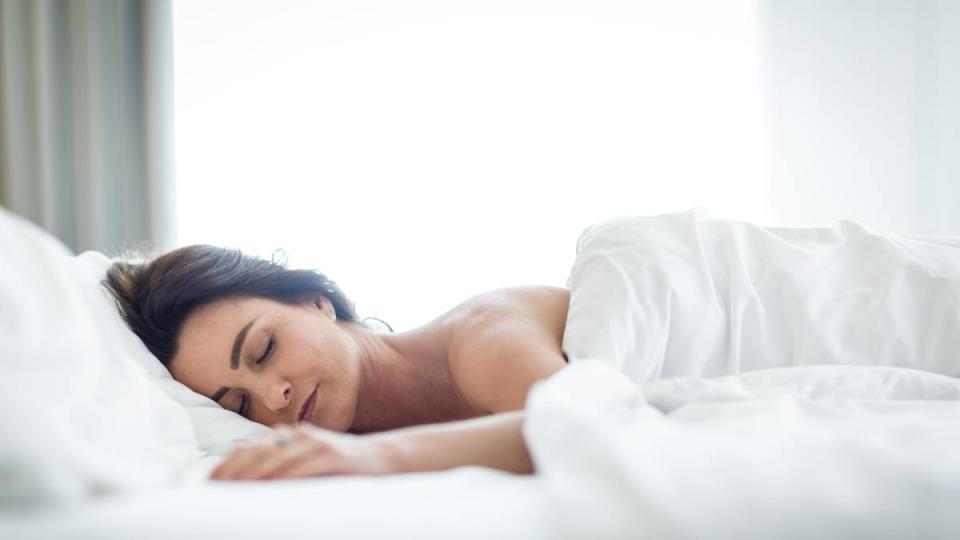Tired of Tossing and Turning at Night? MD Reveals How Long Melatonin Takes To Work
If you’ve ever struggled to get a good night’s sleep, you may have turned to melatonin, a hormone that promises sweet dreams. But unlike traditional sleep medications, melatonin doesn’t knock you out instantly. Instead, it works behind the scenes, helping your body establish its own natural rhythm. So, how long does melatonin take to work when you have insomnia?
Turns out it's less about immediate effects and more about supporting your sleep-wake cycle over time, explains Wendy Warner, MD, a functional medicine specialist. “It's not to be taken just as needed when you're having a bad night's sleep," she says. "It's to be taken every day to help normalize your sleep-wake cycle." Here, we break down how quickly you can expect to see results, plus how to boost the benefits.
Melatonin is the body's sleep hormone
Often touted as a natural sleep aid in supplement form, melatonin is a hormone primarily produced by the pineal gland in your brain. Its production levels fluctuate throughout the day, and it’s primarily regulated by light exposure. Melatonin is produced when the retina in the eye registers darkness. It plays a critical role in regulating your circadian rhythm, or your body’s 24-hour internal clock. This rhythm helps signal to your body when it’s time to sleep and wake up.
See also: This Simple Timing Trick Can Help Stop Someone From Snoring, Top Sleep Expert Says
How long does melatonin take to work?
Contrary to popular belief, melatonin doesn’t act like a sedative. Rather than inducing immediate drowsiness, it prepares your body for a stable sleep-wake cycle. Dr. Warner says its effectiveness is tied to your body’s natural rhythm. That means asking "how long does melatonin take to work?" may not be the most helpful way to think about it. Instead, consider how melatonin supports your overall sleep pattern.
It does so by signaling to your body when it's time to sleep. This process doesn't produce an instant feeling of drowsiness, but rather works to regulate your sleep over time, Dr. Warner says. Taking melatonin regularly helps your body recognize and adapt to a consistent bedtime and wake-up time, making it easier to fall asleep, stay asleep and wake up naturally.
Taking the sleep hormone right before bed ensures it aligns with your internal clock. "Because melatonin gets produced when we’re asleep in the dark, you don’t want to take it during the day," Dr. Warner explains. "But if you take it right before bed, it doesn’t matter exactly when, as long as it’s just before you turn off the lights."
That said, the effects of melatonin typically tend to kick in within about an hour or two. But it can start to affects some people's internal body clock in as little as 20 minutes.
How long does melatonin last?
As we age, sleep disturbances become more common. So if you're taking melatonin for deeper Zzzs, you're likely wondering if it'll help you snooze soundly until your alarm goes off. The answer: It can. When taken consistently before bed and paired with healthy sleep habits, melatonin can help you sleep through the night, assures Dr. Warner.
See also: 6 Science-Backed Ways to Get Deeper Sleep — And They Can Start Working Tonight
What to look for in a melatonin supplement
When it comes to supplementation, quality matters. Dr. Warner recommends plant-based melatonin because it often includes additional plant compounds that enhance melatonin's effectiveness. "With plant melatonin, you can use really low doses," she notes. "3 mg of a synthetic probably won't be very beneficial, but 0.3 mg of a plant-based one works really well." Her go-to is Symphony Natural Health's 0.3 mg Plant Melatonin.
While some foods like cherries and walnuts contain melatonin, Dr. Warner is skeptical about their efficacy without more research. “There isn’t good research to show that there's anything you can ingest enough melatonin in it to make a difference," she notes.
How to make melatonin work for you

Dr. Warner emphasizes that melatonin should be part of a broader approach to good sleep hygiene. Irregular sleep patterns can disrupt melatonin production and make it harder to fall and stay asleep.
“It's still a good idea to do all the usual sleep hygiene like sleeping in a dark room, getting off screens at least 30 minutes before lights out and going to bed at the same time every day,” she advises.
She also stresses the importance of a dark environment, since melatonin is produced when it's dark. Ensuring your sleeping space is free from light sources can significantly boost its effectiveness. This means turning off electronic devices well before bedtime and perhaps investing in blackout curtains or a good, comfy sleep mask.
“Supplements are supplemental,” she adds. “You still need to have the basics of good sleep habits down. If you keep doing things that will mess up your sleep, melatonin won’t make up for it.”
For more ways to usher in sound sleep:
This Simple Timing Trick Can Help Stop Someone From Snoring, Top Sleep Expert Says
6 Science-Backed Ways to Get Deeper Sleep — And They Can Start Working Tonight
Doctors Reveal the Best Sleeping Position to Outsmart Nighttime Leg Pain
This content is not a substitute for professional medical advice or diagnosis. Always consult your physician before pursuing any treatment plan.

